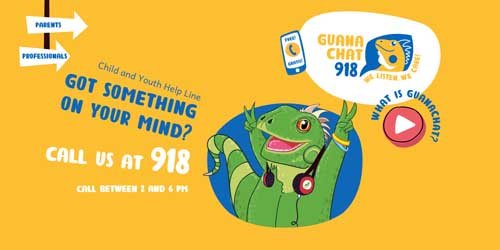Saba and St Eustatius have also had a children’s telephone for a few months now. Children seem to mainly want to talk about their love problems, but they also call to have ‘serious conversations’ about loneliness and violence.

Problems around love, relationships, and bullying behavior are common among children who call. Loneliness, physical violence, their home situation, sexuality, and problems at school also appear to be reasons to call in the Guana Chat 918 helpline.
Whoever calls, gets someone from Aruba on the line
The helpline has been set up by the Ministry of Health, Welfare and Sport together with the foundation Kindertelefoon Aruba. As of March, children on St Eustatius (3,200 inhabitants) can call. Later, Saba (1,900) was also affiliated. In order to guarantee anonymity in such small communities, the children from Saba or St Eustatius receive a volunteer from Aruba – 900 kilometres away – on the line.
“Children are relieved that they can call Aruba,” says Mildred Rijhiner. She is the coordinator of domestic violence and child abuse for Saba. “We’ve heard parents and children say, “If you call and you feel like they’re on the line who you are, it stops.”
Many conversations ‘serious’
Both from Saba and St Eustatius, the first contacts were already ‘serious’, says James Sneek. He is the director of the children’s telephone in Aruba. “So far, 53 children or young people have contacted Guana Chat 918. The youngest caller was five years old and the oldest was 35 years old. Most of the contacts are categorized as “serious.”
“The children who have contacted for serious conversations have all been referred to their school, community organization or a family member.”
“That is the strength and also a bit of a guarantee that it is more than a phone call,” says Dirkje de Jong, Social Support Manager for the municipality of St Eustatius. “We only register whether it is a boy or a girl, the age, and what is going on. Then we look together with the children’s telephone Aruba what we can do with it. For example, what should we do about the fact that so many children are calling about bullying?”
Every island is different
On Aruba, the children’s telephone has been around for more than twenty years. But just expanding to Saba and St Eustatius is not possible. The culture on the different islands is really different, say those involved. “Think, for example, of the way of parenting and leisure activities,” says Sneek. “So it was important for us to first gain more insight into the cultural aspects of the children on Statia and Saba. That gives you more tools to give help.”
No European glasses
“You often see on Aruba, and on the other islands, that professionals have studied in the Netherlands and then look at solving problems from a European perspective, so to speak,” says Sneek. “We have a lot of people from different backgrounds and from the different islands.”
What is also striking: all volunteers in Aruba speak four languages. English, Papiamento, Spanish and Dutch. The intention is that the helpline will also be available for Bonaire.
The whole of society is involved
“Because of the small scale, we have literally involved the entire society in the children’s telephone on Saba from the beginning. From parents to the churches and the daily management of the island,” says coordinator Rijhiner. “Otherwise, I don’t think it would have had such a big impact at launch.”
Sometimes people reacted suspiciously to the idea of a children’s telephone. “For example, parents asked us: do you mean my child is going to call to complain or something?”
“On Saba, it is just a little easier to reach everyone than on Statia, but you notice that more people embrace it,” says De Jong. “Although there are always people who are against this. But if children are helped with the children’s telephone, then this is ultimately a gain for society as a whole.”
Marit Severijnse, Caribisch Netwerk

 Saba News News and Information from Saba Island, Dutch Caribbean
Saba News News and Information from Saba Island, Dutch Caribbean

The children’s Guana Chat Child Helpline is a vital service for many children, teenagers, and youths. We all need someone to talk to in confidence, but many people don’t have that safe, non-judgmental person. The young people will get guidance, and hopefully, serious help.
When I was a lonely teenager, there was no one who I could trust to talk to. That affected my life throughout adulthood in a negative way. The quality of our young people’s lives will be vastly improved by this service. I am glad to see it reach our small islands.